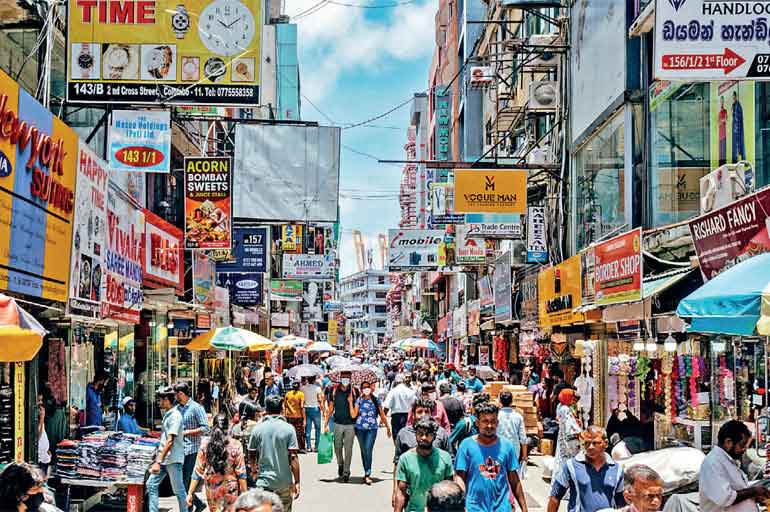Monday Feb 16, 2026
Monday Feb 16, 2026
Thursday, 27 April 2023 00:01 - - {{hitsCtrl.values.hits}}

How do businesses and citizens learn that a country cannot develop on handouts and personal favours?
Background
 A year ago, Sri Lanka was in a dire crisis. The Government had no money and the country had no foreign reserves. The country was without essential medicines, staple foods, transport fuel, cooking gas, electricity and fertiliser. Consequently, livelihoods were lost. Yet, the majority of Sri Lanka’s elected representatives, the Executive and 225-strong Legislature, seemed impervious to the crisis.
A year ago, Sri Lanka was in a dire crisis. The Government had no money and the country had no foreign reserves. The country was without essential medicines, staple foods, transport fuel, cooking gas, electricity and fertiliser. Consequently, livelihoods were lost. Yet, the majority of Sri Lanka’s elected representatives, the Executive and 225-strong Legislature, seemed impervious to the crisis.
Eventually, the efforts of a peaceful people’s “Aragalaya”, supported by an entire population, rid the country of an elected President, Prime Minister and Finance Minister, a Central Bank Governor and a Secretary to the Treasury, whose policies had sent the country reeling into the worst economic crisis of independent Sri Lanka. Sadly, that magnificent effort was hijacked by violent elements, who used arson and terror to reduce the country to near anarchy for their own devious ends.
That is now water under the bridge. A year later, Sri Lanka is limping back to some semblance of normalcy, under the stewardship of a President who did not have citizens’ votes to enter Parliament in the last election. An experienced politician, he is effectively there by default, having been in the right place at the right time, by taking on a premiership which others avoided.
Many people now opine that he is the best option for the country at this time. And so, he shines in the mud of 226 representatives the people themselves elected, but did not hold accountable. Meanwhile, the underlying structural crises in several areas – food security, national debt, public finance, state services, labour market – and corruption remain.
Who is responsible for the crisis?
So, whom do we blame? Blaming others is easiest.
Some say “the Rajapaksas”. But they, and their team, were merely a politically savvy family, self-serving to the end, with neither acumen nor ability to steer the country forward. Their only objective was to further their own ambitions for money, power and position, which they did, for a while, with unimaginable success.
Some go back in time and say “that old fox, JRJ”, who infamously created an Executive Presidency and an electoral system based on District proportional representation. Today, we face the adverse outcomes of 40 years of an all-powerful presidency in incompetent or unprincipled hands, and of electorates too large to hold Members of Parliament accountable to their voters.
Neither JRJ nor the Rajapaksas could have wreaked such havoc without an entitled citizenry with unrealistic expectations, who relied heavily on unsustainable policies and political patronage, rather than their own efforts, for advancement. So, let us turn the spotlight on ourselves, Sri Lanka’s citizens.
Entitled citizens and unrealistic expectations
Most citizens, rich or poor, educated or not, balk at paying taxes. But their expectations of governments are four-fold.
First, expectations of free State services (education, health). Second, expectations of State handouts ranging from under-priced utilities (electricity, water, fuel, cooking gas) to subsidies for consumption (bread, transport) and business (fertiliser, plantation crops). Third, expectations of random low interest loans and tax breaks (tourism, manufacturing, agriculture, film industry). Citizens expect Governments to magically finance these. Do they know that taxes or loans finance Government expenses?
Fourth, expectations of political patronage to provide jobs, school admissions, job transfers or promotions and to facilitate business contracts, unrelated to the abilities of recipients. While politicians expect and citizens provide returns for such favours, Sri Lanka can never become a merit-based system of professionals.
A collapsed system, entitled politicians and the reality gap
Our system of Government has collapsed. We have forgotten that elected representatives exist to serve the people’s needs. Politicians thrive at marriages, funerals and almsgivings. “Selfies” taken with political leaders flood the internet. Instead of holding politicians accountable for discharging their responsibilities, citizens pay them homage, thereby creating an entitled breed.
This attitude allows politicians to act above the rules applicable to citizens – to halt traffic and exceed speed limits, so they can proceed uninterrupted on busy roads; to break queues for items in short supply, a separate system to obtain scarce fuel – only because citizens allow it. Hence, most politicians, in Government or opposition, become accustomed to such acquiescence. Many come to expect it and the ensuing perks. How many elected politicians pay for personal expenses in a store, restaurant, hotel or hospital? Consequently, they have little experience of the day-to-day life citizens face – traffic jams, transport delays, queues, finding essentials in short supply, paying for family treats outside the home. So how can they be expected to understand people’s needs? They become increasingly isolated from the ground reality, relying heavily on those who have their ear.
In times gone by, apolitical public officials with experience and acumen advised their political leaders. They provided constructive criticism. Leaders listened. Today, in a highly politicised service, blind loyalty takes priority over ability. With criticism perceived as disloyal, senior public officials remain fearfully silent. Instead, the ears of the leaders are hijacked by others, the “wannabees’, with their own agendas for position, power or business advantage. Therein lies the dilemma.
Our system of Government has collapsed. We have forgotten that elected representatives exist to serve the people’s needs. Politicians thrive at marriages, funerals and almsgivings. “Selfies” taken with political leaders flood the internet. Instead of holding politicians accountable for discharging their responsibilities, citizens pay them homage, thereby creating an entitled breed
Dependence on Government and unsustainable policies
At independence, Sri Lanka had the advantages of geographical location, natural resources and high human development indicators. Yet, with unrealistic dependence on Government, in time the state sector ballooned. Today, overstaffed state institutions with overlapping functions abound, with no plan for rationalisation. In 70 years, Sri Lanka fell far behind, the outcome of mismanagement and low productivity.
Over 65 state institutions, funded by taxes and loans, “support” agriculture. Yet, in pre-COVID 2019, 2.2 million people were food insecure. Today, agriculture absorbs 28% of workers, but contributes only 8% of economic output, with labour productivity well below other sectors. Until the crisis, village farmers and highly influential plantation companies, alike, relied on Government subsidies for fertiliser, replanting and transplanting. Despite so much “support”, farmers still depend on imports and the Department of Agriculture for seeds to grow vegetables, unable to produce enough on their own.
Thirty years ago, the doyens of corporate management took over 23 plantation companies holding tremendous land assets. Potential for long-term investment – in higher value-added tea and rubber, high-end fruit and vegetable cultivation and horticulture, forestry, high-end tourism, hydro and dendro power – was endless. Yet, who used such opportunities? Many continued, as from British times, to produce primary products from plantation crops for export. When international prices were high, they paid good dividends and bought company vehicles, and when low, they requested Government handouts.
Sri Lanka opened manufacturing and export processing zones in 1977 for foreign direct investment (FDI). Non-sector-specific, long-sighted policies for essential infrastructure, simplified procedures and a stable socio-political environment, would have encouraged long-term FDI with technology transfer. But, influenced by self-interest lobby groups, short-sighted policies for tax holidays and low tax rates for specific sectors encouraged mainly short-term FDI, which terminated with the tax holidays. Consequently, many countries in the region have overtaken Sri Lanka in attracting FDI. Meanwhile, despite “support” from GCEC (now BOI), EDB and several other state institutions, procedures remain cumbersome. Exports still depend on handouts like GSP + to be viable.
In tourism, the internet provides instantaneous information to a new generation of clientele, who prioritise unique, new travel experiences and environmental concerns. Catering to such demand are highly successful tourism ventures in the SME sector, that preserve the environment and show-case Sri Lanka’s cuisine and incredible biodiversity, maintaining low overheads. Yet, old-school corporates and “new money” investing in low-end tourism, have greater negotiating access and influence over state institutions which “support” tourism, rather than these SMEs.
These corporates own large resorts with high overheads around the country. Those were successful with global travellers 40 years ago. Many such resorts cater to two-week budget holiday-makers with limited disposable income, making their profits on tourist volumes, rather than high value-addition. They pay dividends in good times and ask for handouts in bad! At a public discussion on the disastrous 2020 Budget, the Chairperson of The Hotels Association of Sri Lanka, first commended “business incentives”, rather than handouts, given in the Budget, and, in the next breath, asked for a Government grant or interest-free loan to pay their hotel employees during COVID – a handout!
The concept of risk versus return is unknown in Sri Lanka. The philosophy has been to spend lavishly in good times and get State bailouts during bad. Rather than raising productivity, wages and professionalism, we continue to expect Government favours and handouts to succeed. Some, who believe that “who they know is more important than what they know”, are ready to stroke egos to push personal agendas. Those with integrity and no personal agendas, remain silent. Perhaps they know, from experience, that constructive criticism will not be heeded, in this toxic environment. Without their voices, like those before him, our leader becomes increasingly isolated from the ground reality.
Questions
So, what must be done?
How do those with the acumen and integrity, get leaders to heed constructive criticism?
How can public officials attain, and be made responsible and accountable for key positions, on merit?
How do businesses and citizens learn that a country cannot develop on handouts and personal favours?
How do businesses and citizens learn that taxes are needed to finance state services?
How do politicians learn to serve citizens, not themselves?
How can citizens learn to make politicians accountable, not entitled?
Sri Lanka has only temporarily and superficially overcome the crisis we suffered. We need to address the above, to permanently rise from it.
(The writer is a former Assistant Governor and Director of Statistics of the Central Bank of Sri Lanka. She also served as a member of the Independent Delimitation Commission of Sri Lanka.)